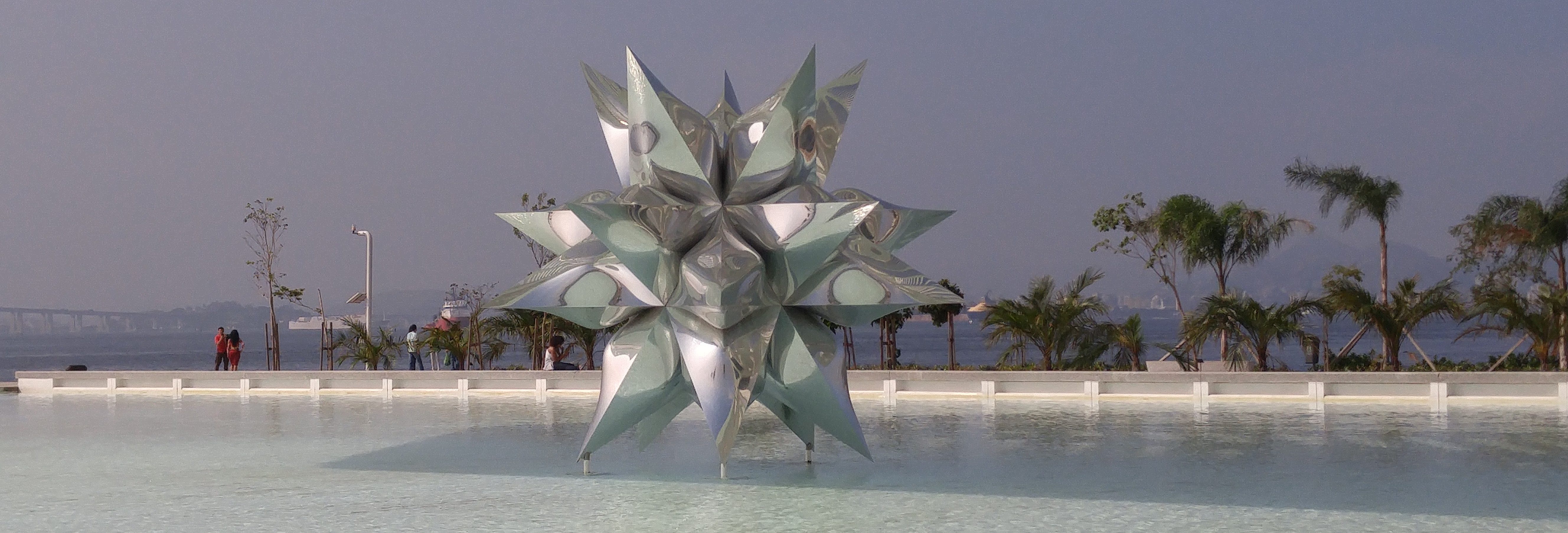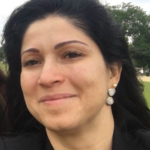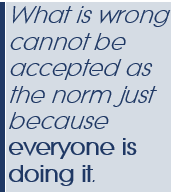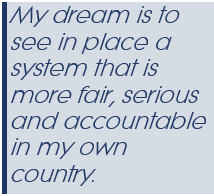
25 May Judiciary Interpreting in Brazil
May Soon Enough Become a Reality
Judiciary interpreting in Brazil has found a champion in Jaqueline (Jaque) Nordin. While preparing for her presentation for NAJIT’s 39th Annual Conference in June, Jaque found time to have a chat with The NAJIT Observer, and we share it below.
TNO: Where does your passion come from?
I believe my passion is intimately connected with my sense of fairness, of what is and what is not right. What is wrong cannot be accepted as the norm just because everyone is doing it.
TNO: What inspired you to create the Judiciary Interpreting in Brazil program for I2B?
After reading the book Blue Ocean Strategy, I decided – and it took a lot of courage- that I myself could create a path toward solving the lack of training issue. Along the way, many influencers have embraced the cause as if their own, which served as a catalyst for this project.
My two main objectives are (1) to improve the awareness of working interpreters, future interpreters and, above all, of the court system itself – judges, lawyers, prosecutors, etc.; and (2) to establish a process for training, certification and selection of skilled professionals.
My dream is to see in place a system that is more fair, serious and accountable in my own country. The 5-month (44 hours) I2B program is a strong platform to take it forward.
TNO: What changes do you expect to see as a result of this program?
In fact, there are changes already taking place where professional awareness is concerned. But I want to see more; more awareness and in-depth study of judiciary interpreting as it is already used in developed and developing countries. In Brazil, we can only find formal instruction available for conference interpreting. As a result, healthcare and judiciary interpreting are mostly ignored by teaching programs.
 Jaqueline Neves Nordin, together with Flávia Lima and Judge Paulo Marcos Rodrigues de Almeida, will be presenting Terminology Hacks for Portuguese Interpreters on Sunday, June 10, 10:30-12:00 during NAJIT’s 39th Annual Conference. Jaque is a Researcher & Interpreter Trainer. She has also worked for nine (9+) years as a Court Interpreter at the Guarulhos Federal Courthouse in São Paulo, Brazil. She holds a graduate certificate in Translation and Interpretation from Gama Filho University (Rio de Janeiro, Brazil), and continued her studies at the Glendon School of Translation – York University (Canada). Jaque managed to find time to author a much needed court interpreting handbook on Code of Ethics and Professional Standards for Brazilian professionals and develop the introductory course on Judiciary Interpreting for I2B, an online school.
Jaqueline Neves Nordin, together with Flávia Lima and Judge Paulo Marcos Rodrigues de Almeida, will be presenting Terminology Hacks for Portuguese Interpreters on Sunday, June 10, 10:30-12:00 during NAJIT’s 39th Annual Conference. Jaque is a Researcher & Interpreter Trainer. She has also worked for nine (9+) years as a Court Interpreter at the Guarulhos Federal Courthouse in São Paulo, Brazil. She holds a graduate certificate in Translation and Interpretation from Gama Filho University (Rio de Janeiro, Brazil), and continued her studies at the Glendon School of Translation – York University (Canada). Jaque managed to find time to author a much needed court interpreting handbook on Code of Ethics and Professional Standards for Brazilian professionals and develop the introductory course on Judiciary Interpreting for I2B, an online school. Not speaking the language of the country you are in, regardless of the situation, is already a veiled threat. Should the individual in custody also have to pay for the crime of not speaking the official language of his hearing? Should the patient suffer more because she does not speak the same language as her doctor?
I hope we may incorporate a degree of humanity in programs offered by teaching entities in Brazil, so that one day justice and healthcare can share the glamour of conference interpreting, with the appropriate compensation.
TNO: How did you structure the I2B program in terms of approach?
The introductory program starts with a historical overview and analysis of existing systems showing the fragility of the system used in Brazil while emphasizing the possibility of a positive change in the future. Afterward, we study the theoretical part – codes of ethics, professional conduct. In the practicum, we study protocols through situations regularly encountered in hearings, using scripts that I have developed based on real situations.
 TNO: Did you look for models in other countries or developed your own based on the deficiencies and needs you identified?
TNO: Did you look for models in other countries or developed your own based on the deficiencies and needs you identified?
I researched models from other countries. I went to San Francisco, California, to do an observation-internship in a courthouse where international hearings are held. I attend hearings in Estonia, where I lived. I was a volunteer in Jamaica, through the Brazilian Embassy, to help Brazilians in custody, etc. All this just to learn more about this unchartered (for us, Brazilians) world. Furthermore, I enrolled in the Glendon College program to learn the theory (I already knew the practical part) so that I would have a solid basis when I started to teach judiciary interpreting and address the students with confidence.
TNO: The legal systems are so different, tell us which parts of the US system of judiciary interpreting do you think could be used by judiciary interpreters in Brazil.
Everything can be used, once duly adapted to the Brazilian legal system. Also, the codes of ethics practiced in most US states, with some reservations and adjustments, could serve as models for the development of a code of ethics and standardization of professional conduct in Brazil.
TNO: There are always at least two sides to each issue. As a neutral party, what deficiencies do you see on the side of the judges and lawyers with regard to their work with interpreters?
Many prosecutors and judges do not know the proper way to ask questions when working with interpreters. They use indirect speech, asking questions in the third person singular, a practice that has been banned in the US for over 25 years. Furthermore, they are not familiar with the role of interpreters and their real function in this orchestra.
But I’d like to point out, once again, that they –judges, lawyers, prosecutors, interpreters– are not to blame for this interpreting black hole: the system has to make this knowledge available to them somehow.
TNO: And what are some of the deficiencies you identify on interpreters’ performances?
There is no training, no certification and, as a result, no trained professionals, not even Brazilian literature on this field of specialization. To give you an idea of the level of skill surrounding the profession in Brazil, bilingual individuals are appointed after passing a statewide, generic language competency exam, and magically become judiciary interpreters.
Selection of interpreters is done from among those known by the public servant responsible for finding a professional. One of the sources is a roster called Assistência Jurídica Gratuita (free legal aid) where people who believe they are capable of assisting individuals who need help with legal problems – interpreting included – enter their names and wait to be called upon by the courts, lawyers or police.
TNO: Who do expect to see more opposition from, judges and lawyers or from interpreters?
 Well, older judges do not accept that they need to be trained to work with interpreters. Lawyers are not aware of any need for training due to the system used in Brazil. Here, the Court lends the interpreters to the lawyers.
Well, older judges do not accept that they need to be trained to work with interpreters. Lawyers are not aware of any need for training due to the system used in Brazil. Here, the Court lends the interpreters to the lawyers.
The greatest opposition is from the TPICs – Tradutor Público e Intérprete Comercial [Sworn Public Translators and Commercial Interpreters], commonly known as sworn translator/interpreter, because they have already passed the credentialing exam and do not feel they must meet any other training needs. Currently, court work is no longer restricted to TPICs. Other interpreters can work in court also, however, they are not attracted to the service or the training because, on the one hand, the courts do not require they are better prepared; on the other hand, compensation for the job is not attractive.
TNO: What type of response do you hope to get?
First, open-mindedness. That my colleagues would be open minded and listen respectfully. If we manage to share with my interpreting colleagues the differences between specialties, their specific uses, peculiarities, etc., judicial interpreting would gain supporters from the dissemination of this knowledge.
It is difficult for those with more years of practice to leave their comfort zone and accept that there is “life” beyond conferences… It simply is human nature not to want to leave the Comfort Zone. We get it.

Wow! What an inspiration Jaqueline is. She saw a need and took action. She didn’t wait for the system to catch up, she changed the system. I am so proud of you Jaqueline! Keep up the great work!
Thanks dear. I am glad I found great people along the way who gave this project the support it needed. Fortunately it became a tangible, consistent and doable project.
Very interesting! Your article reminds me of what I have read regarding the need for skilled court interpreters (PortugueseEnglish) in Ireland where a proper certification system does not exist either. What language(s) do you interpret at the Federal Courthouse in Guarulhos?
Hi, Abigail. I am so sorry it took me years to reply. I just didn’t see the comments after my own comment above. My pair of languages is: Portuguese/English) I live in Sweden now and I continue my research from here. Feel free to contact me if you need me and/or want to know more about this subject.
Congratulations Jaqueline. You have developed a beautiful job and have undoubtedly made a difference in forensic interpretation and translation.
Thanks Ataide. I would never have done anything without the support of dear colleagues within the judicial system.
Congratulations to the NAJIT for the interview. Jaqueline is a great professional and has made a difference in interpretation and forensic translation.
We have to thank Gladys Matthews for suggesting the interview and making it possible by bringing the parties together.
No words could express how thankful I am for having crossed professor Gladys Matthews path. She is undoubtedly a solid pillar of our profession and a role model for all interpreters who seek for excellence.
Najit is, without a shadow of doubt the cradle of best practices professionals. I am proud to be part of Najit’s family.